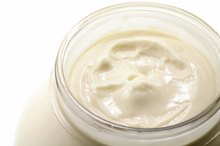What Is a Ready-to-Eat Food?
Ready-to-eat food are foods you don't need to cook food that has already been cooked. You store these on your pantry shelf, or in the refrigerator or freezer, until you are ready to use them. Although ready-to-eat food is convenient, some require special handling to ensure food safety.
Types of Ready-to-Eat Food
Much of what you have in your kitchen qualifies as a ready-to-eat food. Deli meat, salad, sandwiches, cheese, dry cereal, nuts, and fruits and vegetables are a few of the many food items that you do not need to cook before use. These are particularly convenient when you need a quick snack and you don't want to spend time in the kitchen.
Food Safety
How Many Calories in Vietnamese Food?
Learn More
To prevent foodborne illness, the U.S. Food and Drug Administration recommends that you practice several safety precautions. Keep your refrigerator set at 40 degrees Fahrenheit or colder and your freezer at 0 F. At 40 F or colder, you can safely store salads and opened packages of luncheon meat in your refrigerator for three to five days, and unopened packages of luncheon meat for up to 2 weeks, according to Food Safety.gov. You can freeze unopened or opened packages of luncheon meat for one to two months. Storage times for refrigerated dairy products vary.
The shelf life of breads stored at room temperature of 70 F is three to five days, store-bought layer cakes for three to seven days, croutons up to six months, and store-bought cookies up to two months, according to What's Cooking America. Check the use-by date on all items. Keep your refrigerator clean and dry, and wash your hands with warm, soapy water before eating. Check pantry items frequently for moths and mold.
- To prevent foodborne illness, the U.S. Food and Drug Administration recommends that you practice several safety precautions.
- Keep your refrigerator set at 40 degrees Fahrenheit or colder and your freezer at 0 F. At 40 F or colder, you can safely store salads and opened packages of luncheon meat in your refrigerator for three to five days, and unopened packages of luncheon meat for up to 2 weeks, according to Food Safety.gov.
Related Articles
References
Writer Bio
Carolyn Robbins began writing in 2006. Her work appears on various websites and covers various topics including neuroscience, physiology, nutrition and fitness. Robbins graduated with a bachelor of science degree in biology and theology from Saint Vincent College.









